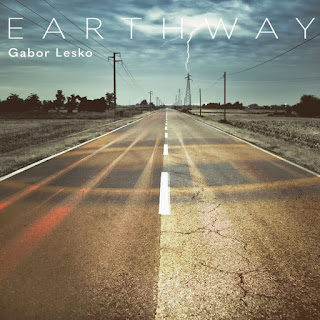 |
| Gabor Lesko: Earthway |
Lesko is a resident of Milan in Italy and is of Hungarian descent. He was educated in classical guitar, piano, and orchestration in Europe and studied at Berklee for a year in 1988. Along the way, he also studied briefly with guitarists Joe Diorio, Robben Ford and Frank Gambale. He is especially known as an accomplished acoustic guitarist, and he has incorporated his formidable fingerpicking skills in a unique way to his facile fusion/prog rock/jazz work on electric guitar.
Earthway is a project that found its genesis in Lesko’s need to continue to create, even though the pandemic effects of Covid 19 made playing with others or for audiences almost impossible. Lesko decided to write or resurrect- the title composition was written twenty years ago- eight compositions and re-imagine them for this interesting and creative album. Along with his formidable skills at acoustic and electric guitars, as well as piano and electric keyboard, Lesko wanted to bring together some talented musicians to realize this project. He had a long-standing friendship with saxophonist Eric Marienthal, who was able to enlist drummers Dave Weck. Other musicians used here include drummers Marco Fuliano, Sophie Alloway, Eugenio Mori and Gergo Borlai and bassists Jimmy Haslip, Hadrien Feraud and Federico Malaman. The Milwaukee Brass Ensemble directed by Eric Marienthal was used on two cuts and vocalist Guido Block sang on one song.
Amazingly, most of the work was done in multiple studios at a distance when personal contact was not practical. My biggest beef with this fine album is the lack of liner notes or identification of the many fine musicians that play on the various songs. How can you rightfully recognize the artists who contribute? I can only identify a few from reading some recent interviews that discuss the album and hint at who plays where. This can be a bit maddening.
 |
| Gabor Lesko ( photo credit unknown) |
The titled track “Earthway” opens the album with Lesko using atmospheric electronics on synth, accompanied by Block’s vocal improvisations and a pulsing electric bass line, most likely by Hadrien Feraud. Dave Weckl’s propelling drums build the excitement. Lesko offers deft and emotionally driven solos on electric and acoustic guitar that just stir the pot with passion. This is an orchestrated song that uses Block’s ethereal vocals. Weckl’s drive, Lesko’s piano accompaniment, and fleet guitar work to take on a Metheny-like feel to this gem.
The music always changes the mood with the fusion driven “Fiesta” utilizing a (maybe Jimmy Haslip) bassline and Tower of Power-like brass section with horns by the Milwaukie Brass that introduces a funky element to this song. Large elastic bass lines and a soaring, electronically enhanced soprano saxophone solo by Marienthal take flight. Lesko’s fusion inspired electric guitar solo is here reminds me a little of Lee Ritenour, erupting with power and fast arpeggios
The ever-ascending ballad “Still Here for You” has a prog-rock feel that features some of Lesko’s impressive electric guitar work. This artist can be a little chameleon-like in his playing. He has an uncanny ability to morph his sound as the purpose serves him. He is definitely not a one-trick pony.
On the ballad “Igor” we find Lesko going back to employing the piano and acoustic guitar. He is aware of pace and the diversity of tone that makes this album never predictable. This composition gorgeously states the melody and uses the variation of tones employing Marienthal’s soprano, Lesko's own beautiful piano, and acoustic guitar to explore tone.
Taking you to another place, “Gently Obsessive” is probably the gentlest song on the album, with piano and acoustic guitar by Lesko on a folk-like waltz. But don’t be lulled, Lesko’s delicate fingerpicking yields halfway through this song to a scorching electric solo that raises the temperature by a few Centigrade before returning you back.
Never one to let the music languish, Lesko comes back with the funk/fusion composition “Push It.” The arrangement is by the young English musician Sophie Alloway who plays drums here. Bassist Feraud makes his bass punctuate the music with presence and Lesko plays piano, synthesizer and utilizes a string accompaniment to make this pop. Lesko’s guitar is never too far from the mix and here he expertly makes his presence known with his versatile finger-picked-like facility on his electric Schecter Custom shop Strat. He can make his instrument sear. Alloway’s drum finale is explosive and noteworthy.
“Mickey Mouse Loves Jazz” is a straight-ahead jazz that features Weckl pushing the pace and Marienthal adding a soprano solo. The bass work is anchored but not sure who is in this chair. Lesko’s guitar tone is a little different again and flows effortlessly, creating fluid arpeggios that simply bloom like flowers in a Spring morning.
The finale is the more atmospheric orchestrated piece “Air (Lost Key Part Two)” which uses dynamic synthesized background that sets the scene for Lesko’s guitar to take flight. The bass and piano play in sync and it has a cinematic sense to this music. Lesko has impressively orchestrated synthesized strings, horns, and piano to paint an aural landscape upon which he overlays his guitar solo figures that create this ambitious visual.

